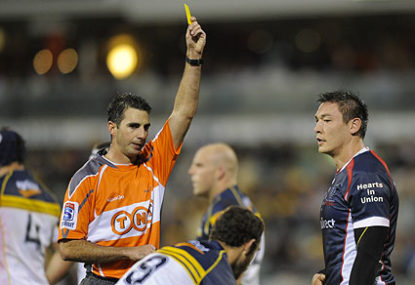The late comic genius Spike Milligan wrote one of the funniest books I ever read. It was about his war days and it was entitled ‘Adolf Hitler: My Part in His Downfall’.
Of late, I’ve begun to wonder if Spike is in fact still alive and writes the IRB rule book, because some of the rule changes that have been made of late are so absurd that I find myself unable to contain outbursts of laughter that are both spontaneous and regular.
I could write all year about rugby’s rules. It is a subject dear to the hearts of many rugby followers.
It is ironic that a game which, as legend has it, started with an act of defiance should have itself become so technically bogged down in rules as to make it incomprehensible at times to both followers and non-followers alike.
If it’s not incomprehisible, it’s frustrating.
The soul of rugby union, if you believe the IRB propaganda, was characterised by a Victorian school boy’s disdain for rules. But today that soul has been enslaved by rules, regulations and interpretations that number in their hundreds.
I wholeheartedly agree with the recent post by biltongbek that the IRB must simplify the rules.
In my view, simplification means getting rid of rules, that is, reducing their number, rather than trying to re-write them.
At the end of the day rugby’s ethos, which is running with ball in hand, can be promoted by enforcing the rules against foul play, rather than focussing on a myriad of technicalities like hands in the ruck, coming through the gate, or truck and trailer.
Why, for example, are players not allowed to use hands in the ruck? Or play the ball on the ground with their hands?
Who says these actions will slow the game up? Has anyone actually conducted a study which proves playing the ball on the ground with your hand will mean the end of rugby union as we know it?
The ball will eventually emerge from the ruck one way or another, if the referee would just wait another five seconds.
I would rather watch a ruck that went on for ten seconds than have a referee blow it up the second it goes to ground then muck around for two or three minutes as a scrum is set and, inevitably, re-set one or two more times.
But I want to focus on two rule changes this year that have had me in stitches. The first is the new scrum re-set call, and the second is the expanded role of the video ref.
Just when the millions upon millions of spectators, players and referees from Buenos Aires to Capetown, from British Columbia to Nuku’alofa and all points in between were getting used to “Crouch, Touch, Pause, Engage”, the IRB change it to “Crouch, Touch, Set”.
Why on earth would you change the call? The only result of the change I’ve seen is an increase in number of collapsed scrums.
But this is typical of rugby’s rules – they are designed to achieve a certain end but in fact achieve an outcome which is the exact opposite of what was intended.
Take the rule I mentioned above about playing the ball in the ruck with your hand.
Ostensibly this rule is designed to promote faster play, so the ball can come out of the ruck quicker with minimal interference.
But the exact opposite happens, because the rule just gives the referee another chance to blow his whistle for a penalty when someone plays it with his hand (which happens in every single ruck by the way), or for a scrum if the ball is tied up in the ruck.
The game would actually be faster and smoother if the rule wasn’t there. That’s the irony; the rule is supposedly there to make the game faster and smoother.
You could apply this reasoning to almost all of the rules in rugby.
Some rules are obviously necessary for player safety, but those that aren’t should simply be removed from the book.
It’s the complete opposite of rugby league, where every rule change since 1895 has been designed to speed the game up.
And guess what? They actually achieve that goal.
In regards to the expanded role of the video ref, the concern I have here is how far back in time can a video ref go?
We may as well have the 80 minute game, and then wait around for another 80 minutes so the video ref can review the whole match to make sure nothing illegal happened from kick off.
That, of course would be ludicrous, but in a critique about rugby union’s rules, such an outcome cannot necessarily be discounted as unintended by the IRB’s rule committee.





























































































